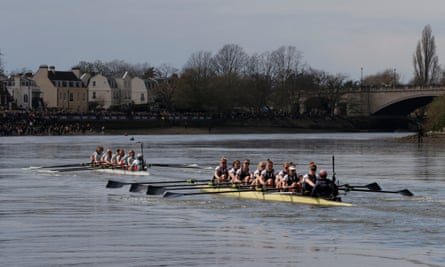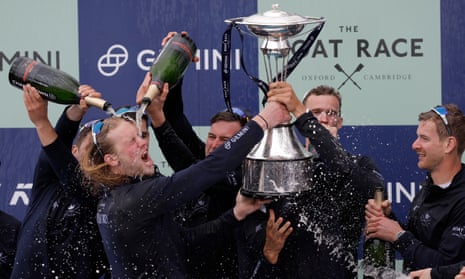As the Boat Race returned to its rightful place on the River Thames for the first time since 2019, the women of Cambridge and men of Oxford each recorded impressively emphatic victories. Cambridge’s dominance of the women’s race now stretches to five successive wins while Oxford’s triumph in the men’s event was their first since 2017.
It was a markedly different story from last year, when the Great Ouse in Cambridgeshire hosted men’s and women’s races that were settled by a length or less. With Grace Prendergast of New Zealand, the world No 1 female rower on board, Cambridge women clocked a record time of 18min 22sec on the four-mile, 374-yard (6.8km) course. After a dominant team performance Prendergast, who won gold and silver medals at Tokyo 2020, said it meant as much as glory at the Olympics.
“They’re both equally as special,” she said after helping Cambridge to secure a 46th victory in the 75th women’s race. “I was caught off-guard with how cool an event this was. This last week has really put it into perspective. Both will go down as a highlight of my rowing career.” Oxford won the toss and chose the Surrey side of the river but there was controversy over the steering of Jasper Parish, the Cambridge women’s cox, who was repeatedly warned by the umpire, John Garrett, for veering to the Surrey side and into Oxford’s path.
“Cambridge, to Middlesex,” was the umpire’s refrain after the Cambridge crew established an early lead and moved across, ending up on the same line as their trailing rivals. Cambridge built an advantage of half a length after a mile and, while Oxford made headway as the boats approached Hammersmith, they were unable to recover. As the crews rounded the bend towards Chiswick Bridge, Cambridge remained in control and sealed a comprehensive victory by two lengths. Joe Gellett, the Oxford Cox, protested to the umpire as the boats came to a standstill, insisting that Parish’s line had impeded Oxford’s progress.
“I’d say it was a very aggressive approach to steering the line, and the course,” Gellett said afterwards. “There was a point where I thought it had gone against what’s stated in the rules. So I thought I’d challenge that.”

“It was aggressive steering, I agree,” the umpire, Garrett, had replied while still on the water. “But it’s not a disqualification.”
Parish, the Cambridge cox, also disagreed. “The Boat Race is very specific in the rules,” he said. “There are a couple of exceptions but you can’t be disqualified unless you make contact with the other crew. There was no point in that race where I was seriously worried about that.”
Bronya Sykes, the women’s president of the Cambridge University Boat Club, said: “All week we’d kind of been hitting splits that said we could set the record. But to execute it just kind of blows my mind … there are so many phenomenal athletes in previous years … to be considered up there with them is such a cool feeling.”
The men’s race followed a similar pattern but minus the controversy. Happily for the thousands of spectators along the banks of the Thames wearing dark blue, though, it was Oxford in the ascendancy. Cambridge won the toss and chose the Middlesex side of the river, suggesting they would be aiming for a dominant start. Oxford’s strategy was also to go out as hard as possible, rather than pace themselves, and leading off with a visibly quicker stroke, they forged ahead by a quarter of a length within four minutes, into a headwind that strengthened between the women’s and men’s events.
“If you can put in a max two-minute effort, break them, then you just pray that they fall off faster than you do, which is kind of what happened there,” said Tobias Schröder of Oxford. “We were slowing down [towards the end] because we went off so hard.”
At Hammersmith Bridge Oxford had surged half a length in front, looking in complete control, and as they neared Barnes Bridge, the lead had widened to more than two lengths. Oxford registered their 81st victory in 166 races, in a time of 16min 47sec.
“I’ve lost a lot of times,” Schröder said. “There’ve been years where it feels like winning this race was my whole life. This year, I changed that up a bit, and tried to see the bigger picture. It’s just a boat race and Monday’s going to come, whether you win or lose. But it means a lot.”

Comments (…)
Sign in or create your Guardian account to join the discussion